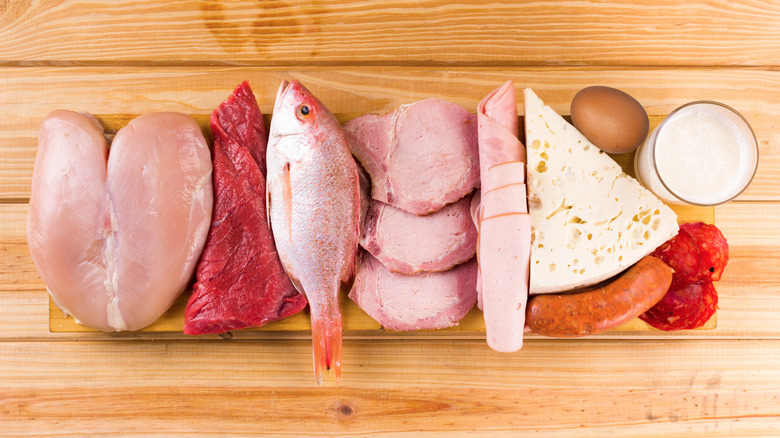What Is The Duke Diet?
Any diet that doesn't require us to spend time counting calories has us intrigued. And the Duke diet, also known as the Dukan diet, is one that avoids the math and instead focuses on what we are filling our plates with. According to Medical News Today, the Dukan diet is a high-protein, low-carb, and low-sugar eating plan that encourages the consumption of natural foods over their packaged counterparts. In the beginning stages of this eating plan, there are 100 "accepted" foods you can choose from — 68 are sources of lean protein, and 32 are vegetables. Later on, you are allowed to introduce more options.
US News states that the diet, designed by former French physician, Pierre Dukan, has four phases: Attack, Cruise, Consolidation, and Permanent Stabilization. It is a diet with many rules. And like many other eating plans that promise extreme weight loss, the Dukan program has a book, a website, online coaching, and centers providing specialized guidance for its participants.
Though the Dukan diet may have been founded by someone with a medical background, it is important to note that, according to The Guardian, Pierre Dukan was taken off the medical register and barred from practicing medicine in France for commercializing the slimming diet that had his name attached to it.
Even with the heavy focus on vegetables, we have to remain skeptical
A key target of the Duke diet is to fill up at least half of your plate with vegetables, leaving little room for more unhealthy options. "Seeing a full plate also helps you feel more satisfied on a low-calorie diet," says Christine B. Tenekjian, a Duke Diet & Fitness Center dietitian, to Everyday Health. "When people come to our program, they're afraid of being hungry, but more often they say, 'This is more food than I usually eat.'"
You may feel full and consume more vegetables than usual while on the Dukan diet. But with all of it's rules and limitations, does the diet really work? In an online survey shown via US News, participants lost, on average, around 15 pounds during the first two phases of the Dukan plan. That said, it's not a simple plan to follow and requires a lot of time for food preparation.
Additionally, the Dukan diet has come under critique over its potential health risks. According to a study conducted by Granada University in Spain, it was concluded that high-protein diets like the Dukan plan may increase the chance of developing kidney disease and kidney stones (via The Guardian). Though Dukan's eating plan aims to fill you up with healthy foods, the possible negative health impacts should be considered before you take on the diet.


